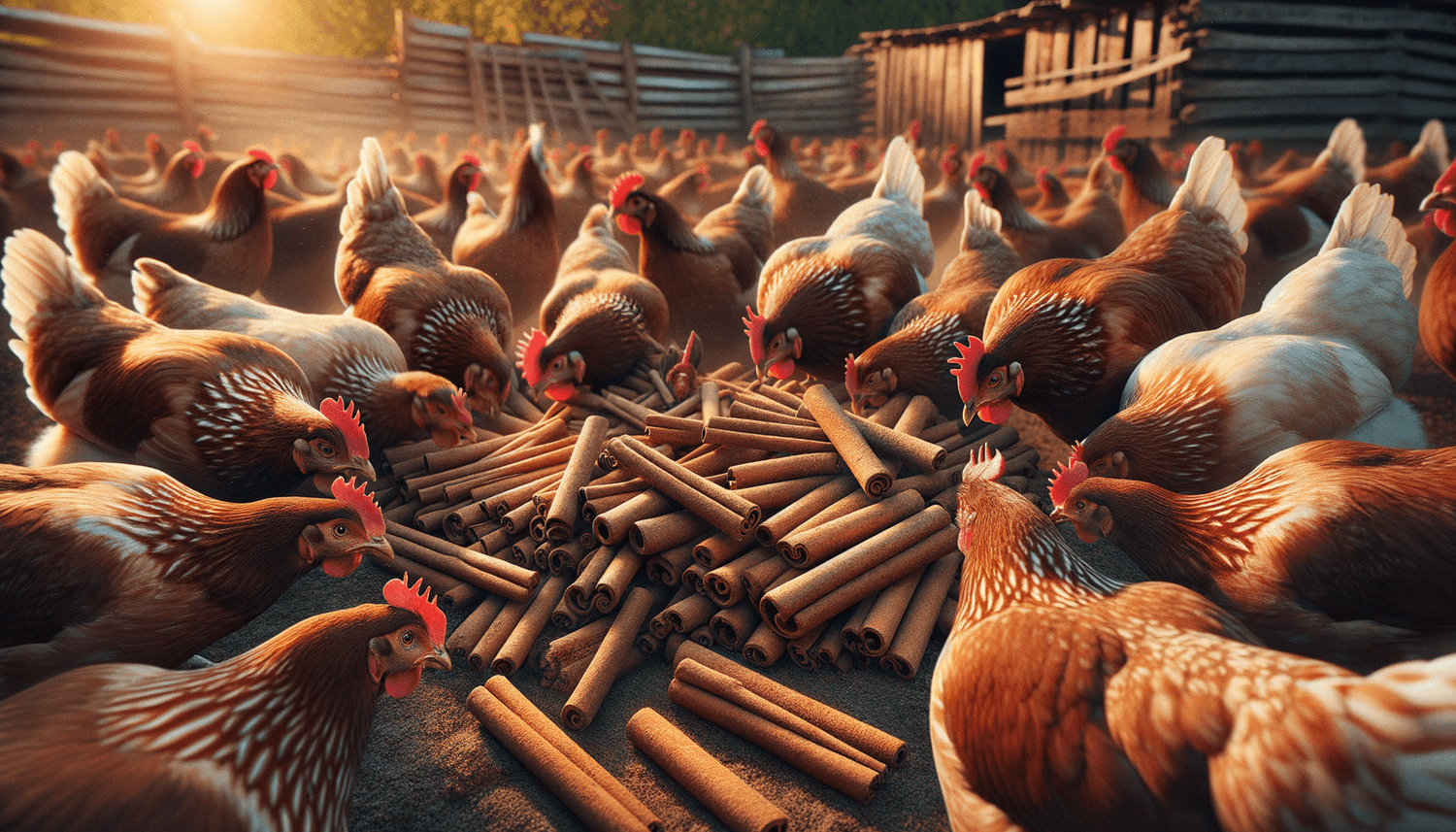Ever watch your flock peck and scratch their way through the day and wonder what new treat might add some zest to both their lives and their clucking dinner parties? Look no further than cinnamon! Yes, that warm and fragrant spice that tantalizes your taste buds in your favorite festive treats! But before you sprinkle this delectable delight over your chickens’ feed, you may wonder if they can actually eat cinnamon or not. In this blog post, we’ll explore the world of cinnamon from a chicken’s perspective – importance of a balanced diet, possible benefits and/or risks, nutritional value, and even how to safely prepare this treat for your fine-feathered friends! Stay tuned for a cluck-tastic adventure! 🐔
Can chickens eat cinnamon?
Yes, chickens can indeed eat cinnamon, and it is safe for them as long as it is provided in moderation. Cinnamon offers various health benefits, such as antioxidant and anti-inflammatory properties. However, it’s essential not to overdo it, as an excessive amount might cause digestive issues or other problems in your chickens.
Chickens need a balanced diet, just like humans
Providing a well-rounded, balanced diet is essential for your backyard chickens to thrive and maintain their health. While it may seem like a trivial aspect, maintaining a balance between their everyday food and supplemental treats is vital for their productivity, growth, and overall wellbeing.
A chicken’s diet should primarily consist of high-quality chicken feed, making up 80-90% of their total dietary intake. Chicken feed is specially formulated to provide optimal nutrition, including the vitamins, minerals, and proteins needed for the birds to lay eggs and develop strong feathers, bones, and muscles. The remaining 10-20% of their diet can consist of nutritious treats like fruits and vegetables. These treats not only add variety to their diet but also serve to boost their overall health and happiness.
Nutritional value of cinnamon for chickens.
Cinnamon is indeed safe for chickens to consume, and it has some nutritional value as well. This aromatic spice contains manganese, a mineral that is essential for healthy bones and the proper functioning of enzymes in the chicken’s body. Additionally, it has trace amounts of other minerals such as calcium, iron, and potassium, though they may not contribute much to the overall dietary requirements of the chicken.
Beyond these mineral contents, cinnamon is highly valued for its antioxidant and anti-inflammatory properties. Antioxidants help protect the chicken’s body from oxidative stress by reducing free radicals, supporting the overall immune system of chickens. The anti-inflammatory qualities may help maintain a healthy gut function in chickens and alleviate digestive discomforts. Furthermore, it is believed that cinnamon may have antimicrobial properties, which could assist in fighting bacterial and fungal infections. While the nutritional value of cinnamon is not as significant as that of a well-rounded chicken feed, it does offer benefits when given as a treat in moderation.
Nutrition table of cinnamon for chickens.
| Information | Description |
|---|---|
| Nutritional Value | Contains manganese, calcium, iron, and potassium along with antioxidant and anti-inflammatory properties. |
| Suggested Serving Size | A few pinches of cinnamon sprinkled onto their feed occasionally as a treat. |
| Safe Feeding Practices | Feed in moderation and avoid giving excessive amounts, as it may cause digestive issues. |
| Preparation | Ground cinnamon can be mixed into their regular feed or sprinkled on fruits and vegetables. |
| Potential Risks | Overfeeding may cause digestive problems and nutrient imbalance if fed in excessive amounts. |
| Hydration | Cinnamon does not contribute to hydration; ensure chickens have access to fresh, clean water at all times. |
| Digestion | Anti-inflammatory properties can aid in maintaining healthy gut function and alleviating digestive discomforts. |
| Seasonal Availability | Cinnamon is readily available year-round, making it an accessible spice to introduce to chickens’ diet. |
| Other Benefits | Antimicrobial properties may assist in fighting against bacterial and fungal infections. |
Introducing cinnamon to your chickens’ diet
Now that we know chickens can safely consume cinnamon and it offers some nutritional benefits, you might be eager to introduce it into their diet. As a starting point, sprinkle a few pinches of ground cinnamon onto their feed, fruits, or vegetables. You can increase or decrease the quantity accordingly based on how your chickens respond to it.
Keep in mind that it is important to observe your chickens for any adverse reactions or side effects. As mentioned earlier, too much cinnamon may cause digestive issues, so make sure you let your chickens’ behavior and health dictate the amount. Always remember, moderation is key.
Consider using cinnamon supplements
If you want to add some cinnamon goodness to your chickens’ diet without the mess of sprinkling it everywhere, you could consider using cinnamon supplements designed for poultry. These are often available at local farm stores or online retailers, and provide an easy method of delivering cinnamon’s benefits. Recommended dosage and instructions can vary, so consult the manufacturer’s guidance and consult your veterinarian for the best approach.
Trying out other spices and herbs
Cinnamon isn’t the only spice or herb that can provide benefits to your chickens. There is a whole world of natural, backyard-friendly options to explore, each with unique flavors and health benefits. Some popular choices include oregano, basil, thyme, and more. So, don’t be afraid to think outside the box and brighten up your chickens’ dining experience with a dash of natural goodness.
By venturing into the world of spices and herbs, you can offer a variety of enriching experiences for your backyard chickens while supporting their wellbeing. Keep moderation in mind and have fun watching your flock enjoy their flavorful new treats!

















